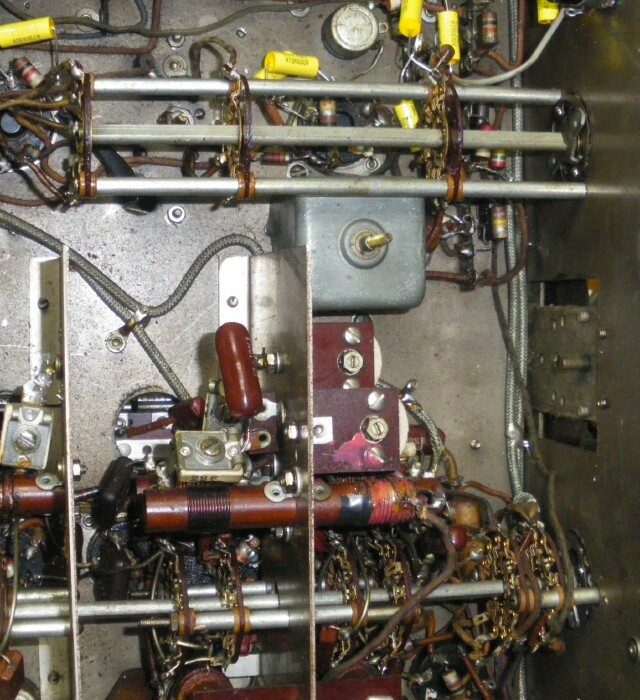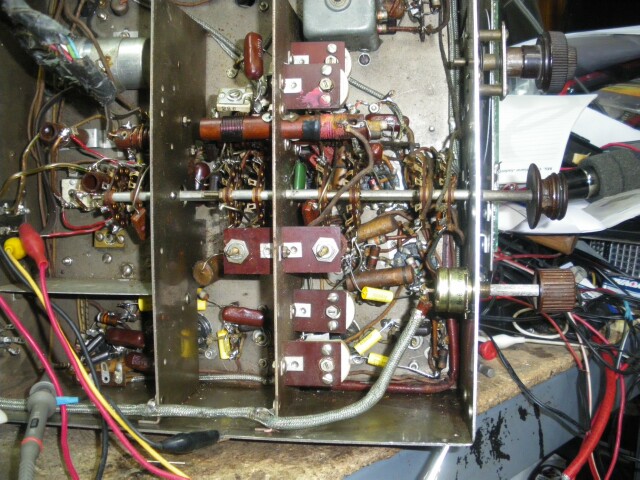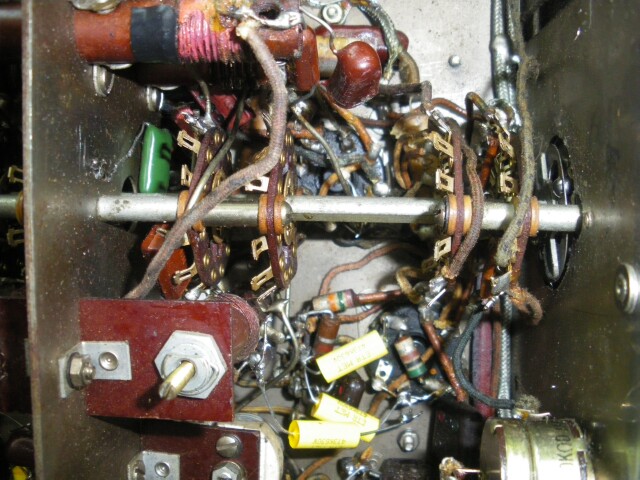Need a decent schematic Scott Laureate
Posts: 599
Threads: 24
Joined: Jan 2014
City: Edmonton AB CA
Lookin good! I follow your stage by stage method as well, I have every intention of recapping and restoring the radio but like to see all that was wrong with it. Sometimes little wrong and other times a list of things.
Gregb
Posts: 141
Threads: 13
Joined: Sep 2011
City: moline, il
Hi Brenda-A nice thread with your descriptions and photos. I have a nice working Laureate and it is a good performer. These were the last major set made and sold by Scott before and just into WW2. I once had another laureate that was sold in April 1942 and there was a stack of service repair tickets with it during its warrantee and Scott had trouble finding good repairmen in the buyer's area (Wisconson). The Laureate went to a large black transformer on the amp to better dissipate heat.
If your set has any cans with brown paper wraps on them, that is a code the set was returned to Scott for repairs. Sometimes there will be a number in pencil written
Posts: 1,106
Threads: 88
Joined: Jun 2011
City: Tacoma
State, Province, Country: Washington
Here's a link where you can check out the output transformer they put on this thing. Apparently, it's supposed to be a pretty good one.
http://www.worthpoint.com/worthopedia/ar...-219938823
If you click on the pic, it goes to other pics.
y2kbruce, this supply has the large black transformer.
Posts: 1,106
Threads: 88
Joined: Jun 2011
City: Tacoma
State, Province, Country: Washington
Can someone tell me what this adjustment is? I can't find anything about it in the service literature that I have.

Posts: 1,106
Threads: 88
Joined: Jun 2011
City: Tacoma
State, Province, Country: Washington
Next bunch of caps done. I've done a complete realignment of the FM section and now it performs very well. Output from the discriminator is perfectly symmetrical, and it sounds great. A few more caps in the RF sections to replace and it should be as good as new.

There is one irritating issue with the FM though. I can get it to track over about half of the band, but it tracks high on the lower part of the band, and low on the high part of the band. If it wasn't for the fact that the other two bands track perfectly, I would suspect that the dial string was strung wrong. Any ideas?
Posts: 1,106
Threads: 88
Joined: Jun 2011
City: Tacoma
State, Province, Country: Washington
A few more caps in the mixer and oscillator sections. The last couple I replaced really brought up the sensitivity on the SW band, I'm hearing a lot of stations now all the way across the band.

So, only 4 paper caps left in the set. These will not be so easy, since they are buried pretty far in. One is even buried inside an adjustment can that I can't even identify from the schematic (see post above).
I did manage to make the calibration of the FM a bit better. The 20K grid leak resistor on the LO had drifted up to 27K. The closest I had to the proper value was a 22K, so I used that for now. Will have to order a 20K sometime down the line. What this did for me was it allowed me to get the dial to track pretty well on the top half of the dial. It's still off on the lower half, but by a max of about 400KHz. This is an improvement over before, when I could align it in the middle, and it would be off by ~700KHz on the bottom and up to 1MHz on the top. Perhaps the proper resistor will bring it in even closer.
Posts: 661
Threads: 141
Joined: Jun 2011
City: Elko,MN.
Looks great Brenda.
Wish I had
your know how and patience.
What did you do for a job when you weren't repairing radio's?
Must have had some formal education in electronics.
You sure know your way around a radio chassis.
How is the cabinet on this one?
Have a great weekend,
murf
Posts: 1,106
Threads: 88
Joined: Jun 2011
City: Tacoma
State, Province, Country: Washington
No cabinet, Murf. I bought the chassis from someone on ARF. Will have to get creative someday, since I have the Laureate and a 500H as well.
There really never has been a time when I wasn't repairing radios, though my skill levels did grow considerably over the many years. I started at about 13 or 14 repairing phonographs and the occasional television for friends. When I was 15, I went more or less 'professional' when I was hired to do repairs for a second hand store. Later, I got into radio broadcasting as well. My first job was a volunteer thing assisting the music director at a local station. I ended up with my own show a couple years later at a public station. Still later, I started doing broadcast engineering as a sort of independent tech. Through all of that, I stayed active in consumer electronics.
That all being said, there's always new things to learn.. all the little quirks and oddities of various particular brands and models. Though I could build a pretty darn good receiver (or transmitter) on my own, I still need to draw on the experience of others when it comes to troubleshooting some sets.
To answer your question about formal education, nope. Though I did sign up for electronics class in high school, I found I was so far ahead of what they were teaching in the class that it didn't work out for me. I learned a lot of theory through a sort of intuition, for lack of a better word. For instance, the basic function of tubes came to me just skimming a tube characteristics manual when I was 16. That's when it hit me, looking at the diagrams, that tubes were not really amplifiers in the true meaning of the word, but instead were linear switches controlling a large voltage with a smaller one.
Posts: 143
Threads: 11
Joined: Dec 2013
City: Ithaca NY
From what I've noticed over the years, the people who have started young and learned electronics sort of on their own or with personal mentors tend to be far better at the practical side of electronics than people who purely learned it in a school. I think it is the inherent interest in the subject that makes them really get to understand the stuff better than someone just doing it for a job. They also tend to be better circuit designers because they've seen all the historical circuits and variations that you just don't find in textbooks.
Brenda, your story sounds very similar to my own. I also can't remember a time when I was not doing something with electronics. I had a grandfather who ran a radio and TV "hospital" so I remember hanging around the TV shop and watching all the goings on very early on. Somehow the smell of charred phenolic always seemed like a natural smell to me!
In my case I went on to get a degree in electrical engineering but during my entire college experience I hardly ever ran into faculty who knew the practical side. They were great at the math and physics etc... but some of them hardly knew what a soldering iron was.
Herb S.
Ithaca NY
Posts: 1,113
Threads: 14
Joined: Feb 2013
City: Irvington, NY
Yes it seems that the best engineers and designers started young with their interest in electronics. Having an early interest and enthusiasm for the subject certainly contributes to success in later professional careers.
My background is similar, starting around age 10 building radios and repairing broken ones, Later, worked on getting amateur radio and commercial radiotelephone licenses, which led to jobs in two-way radio communications while studying engineering in college.
It seems all the engineers that I knew from school that achieved the greatest success, were either hams or hobbyists before ever formally studying electronics. Unfortunately, the present generation of kids don't seem to have the interest, which is not encouraging for the future of technical professions in this country.
You can always tell when an engineer without a practical background designed a piece of equipment when you try to repair it. Servicing electronics before ever designing it gives an insight that is a definite asset.
Posts: 143
Threads: 11
Joined: Dec 2013
City: Ithaca NY
Mondial: I think the newer generation of teenage techies have shifted over to computers. The older generation were electronic hobbyists but now they are the young internet/LINUX/software people. One of my sons like that. He has some interest in electronics but much more with LINUX, web pages, hacking etc... Much more readily available, cheaper etc... than the stuff I used to do at his age.
Herb S
Posts: 1,106
Threads: 88
Joined: Jun 2011
City: Tacoma
State, Province, Country: Washington
I, too, am a ham, and of course with the broadcast engineering, also had a 1st Phone (now a GROL). Also had a CET in consumer electronics and one in SMATV. Let them lapse, though, since I'm no longer doing that work for a living.
Posts: 1,113
Threads: 14
Joined: Feb 2013
City: Irvington, NY
I kept renewing my 1st Phone until they eliminated the requirement for it in servicing land-mobile radio transmitters. I think having one allowed you to be grandfathered into a NABER tech certification, but by that time I was pretty much out of the two way field.
Never did use my license in the broadcast area as there were no jobs available. It did come in very handy in two way mobile as it almost guaranteed you a job because of the FCC requirement at the time.
Posts: 1,106
Threads: 88
Joined: Jun 2011
City: Tacoma
State, Province, Country: Washington
My GROL is what they gave me when I renewed my 1st Phone the last go-round. Not worth a lot in my opinion. It's a lifetime ticket, but at the same time, they took away the requirement for broadcast engineers to have a license. Now any idiot that can sign his name can be an engineer and poke screwdrivers around in multi kilowatt transmitters.
Do I sound bitter???
Posts: 1,106
Threads: 88
Joined: Jun 2011
City: Tacoma
State, Province, Country: Washington
I have the FM tracking within reasonable parameters. It's now off a maximum of about 100 KHz across the band. I accomplished this by spreading the LO coil in conjunction with adjusting the trimmer.
Users browsing this thread: 1 Guest(s)
|



